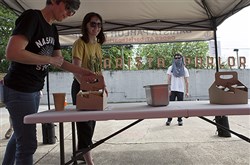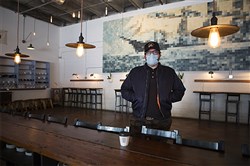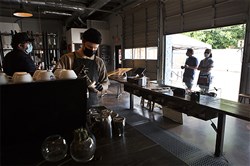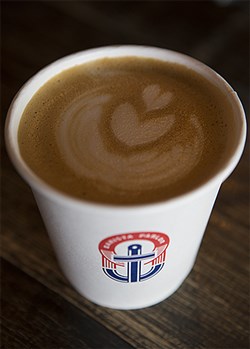VOL. 44 | NO. 21 | Friday, May 22, 2020
From boom to bust to survival mode
By Hollie Deese
Three months ago there was no doubt that Andy Mumma was one of Nashville’s brightest hospitality stars, and 2020 was set to be one of his best years ever.
His flagship Barista Parlor coffee shop in East Nashville was about to celebrate eight years in business, and his Tiki bar, Chopper, was approaching its first anniversary. His roasting company and Barista Parlor locations in Golden Sound, Germantown and Marathon Village were thriving. Later this year he was set to open locations at the airport, at the new W Hotel downtown and at Sylvan Supply in West Nashville.
There was a small blip in his progress after the tornado damaged the roof to his Germantown location and shut down East Nashville. Of course, that kind of setback all seems so much more manageable now that Nashville is months into a shutdown of nonessential businesses to flatten the curve of novel coronavirus cases, a shutdown that started almost as soon as people started coming back into his businesses after the tornado.
“Financially, I felt it across the board, especially in East Nashville,” he says of life post-tornado, pre-pandemic. “The whole neighborhood was in shock for about two weeks. It was almost surreal to go from the shock of the tornado to the beginning of the COVID stuff.”
Mumma was one of the earliest supporters of shutting down for the safety of his staff and customers, closing all locations completely for 30-45 days while continuing to pay his staff full salary, benefits and health care. After that he began adding services in compliance with Nashville’s stay-at-home orders but is certainly feeling the uncertainty of the times – and the uneasiness of getting ‘back to normal.’
“As a business owner I don’t want to be the one pooh-poohing it, but I want to be realistic about it,” he says. “Safety’s the No. 1 priority. We all want to reopen and get back to normal, but we just have to be really smart and considerate about doing this in phases that are thoughtful and data-driven.
“I think just kind of jumping into it just because we all want it to happen and we feel good about it, maybe isn’t the best method to reopen.”
Mumma is one of many who rode the wave of Nashville’s emergence as a hub for great restaurants. The 2010s saw dining options blossom across the city, capturing the attention of local diners, tourists and national food writers.
But that all crashed with COVID-19 and the closing of restaurants and other businesses to help slow the spread.

Customers wait outside to pick up their orders at Barista Parlor in East Nashville. The restaurant didn’t have an online ordering platform until the virus shutdown.
-- Photos By Michelle Morrow |The LedgerSome have survived – so far – through innovation and flexibility, as well as government financial assistance. Many will never open their doors again.
To keep money coming in while his shops were closed, Mumma built out an online ordering platform. He also began offering different options and products, tweaking services and options every week.
“It was just something that we’re kind of just engineered to do,” he explains. “With Chopper we started bottling mixers the day after we closed, and then the day we were allowed to do to-go cocktails, we were selling bottled cocktails. You just kind of had to do it.”
Mumma also added pantry items, created larger-format items that were quarantine friendly, like frozen biscuits, and repackaged products like their iced-drinks and bread, all while figuring out contactless payment and curbside pickup.
“None of it feels weird or uncomfortable or something I never thought about,” Mumma says of pivoting to get through a lack of dine-in customers. “Other entrepreneurs can probably relate to this, but I lay in bed every night thinking about products and different things to add, pandemic or not. It’s just forced us to just put out all of our resources, and instead of slowly launching it all, just rapidly launching it all.”
Pressure to pivot
Janet Kurtz, owner of Kurtz Hospitality Marketing, has been helping her restaurant and food clients navigate through rapid changes.
“In 48 hours we changed Gifford’s Bacon from being wholesale-only to pretty much exclusively consumer-facing,” Kurtz says. “So, that was adjusting items on the website and creating the butcher boxes, which came really at a perfect time because we were seeing the first wave of stores running out of food very quickly. It really gave consumers something that they were looking for, but also allowed Gifford’s to be able to continue moving forward through this.”
It’s that kind of community spirit and a true feeling of duty to support locally-owned businesses Kurtz says is the one shining spot that could come from all of this.
“Where someone may have gone to – name any brand American café-style restaurant – they would now go to a locally owned one to support that person because they understand that’s part of their community,” she adds. “I think most people realize we’re all trying to work through this together.”

Barista Parlor is owned by Andy Mumma who says, “I think just kind of jumping into it just because we all want it to happen and we feel good about it, maybe isn’t the best method to reopen.”
Kurtz has had to do a pivot of her own, helping her restaurant and hotel clients tell their story during the shutdown while rethinking her own services in an uncertain climate.
“This has really affected Kurtz Hospitality,” she says. “We work primarily with the hospitality industry. And so, many of our clients and past clients and friends have either had to shut their doors or completely pull back on the way their businesses are operating. Which then means that during this time we are kind of quiet for them. It’s definitely affected us.”
Financial uncertainty
David Andrews, a Nashville native who left for New York in 2003 to attend the Institute of Culinary Education, worked for years in the pastry department of the Gotham Bar and Grill and did some time with chef Marcus Samuelsson before leading the Kimberley Hotel as executive chef.
After 13 years, he decided to move back home to Nashville.
“I knew I wanted to make a bakery – it was my lifelong dream – so we found a space downtown that I love right next to the library on Church Street,” he says. “We got the space, took about a year and a half to get everything ready and built, and we opened in the summer of 2018.”
Andrews says he is thankful he opened then as opposed to last year – or even right now as he sees so many people struggling downtown.
“The person next to me is just opening their shop – what bad timing,” he says. “At least I’m able to get a little help from the government, but some of these people who just opened their shop … my heart goes out to them.”
Andrews fully shut down D’Andrews Bakery & Café March 17. He saw a 30% decline in sales the week before, and that week he was down 70%. He reopened May 15 – a full two months later – with 50% capacity and curbside pickup.
Andrews never pivoted to a market or curbside or pickup because the great advantage of his location is foot traffic, and he didn’t think it was realistic to expect people to want to park and walk.
“It just wasn’t going to move the needle for us,” Andrews explains. “But yes, now that we are reopening, you’re definitely going to do curbside. We’ll do take out, and we’ll do 50% capacity.”

Barista Parlor owner Andy Mumma, left, and barista, Clay Reid, prepare coffee for customers in East Nashville. He was one of earliest supporters of shutting down for the safety of his staff and customers, closing all locations completely for 30-45 days while continuing to pay his staff.
Andrews would not have been able to reopen at all without receiving PPP funds from the SBA on May 5, and with Mayor John Cooper entering Phase 1 of reopening May 11, the timing worked out well for him.
“It does take a while to ramp up because we had been dormant for two months, so we had to get everything,” he says. “We had huge deliveries on Monday, Tuesday, and we’ve been prepping for the last couple of days and we’re just ready to go Friday.”
Zachary Weiner is the owner of restaurantaccounting.net, consulting restaurants as an outsource controller or CFO, depending on the size of the operation. Previously, he was a CFO for a New York-based restaurant with 20 locations and has written books about restaurant finance. He points out things may be hard now, but some of the biggest financial challenges restaurants face will be a year from now if they don’t see occupancy go back to the rates they were before.
“If we operate our establishments at 20 or 30% less, what does that mean? That means that most restaurants are going to squeeze away a little profit or barely break even,” Weiner says. “Which causes an issue when we’ve taken on loans like the PPP loan, or have extended a line of credit.”
Andrews acknowledges his business could take another shutdown, but only if there was another cushion from the government. “The next two months I’m certainly set, but then come August, we don’t know what’s going to happen,” he says. “If for some reason there’s this incredible second wave coming in the next couple of weeks because we reopened, we could definitely shut down again.”
Now the big topic in my industry is loan forgiveness,” Andrews adds. “I mean, we can’t carry on past this. That’s just not an option.”
Weiner says restaurants that are over leveraged is going to result in a wave of closures that goes beyond the initial loss of business from the pandemic.

Barista Parlor is open for pick up orders made online as well as walk up orders.
“Clearly there’s going to be a lot of people who are not going to reopen as we enter this next phase,” Weiner says. “But next year we’re going to end up with a whole other wave of defaults because people have over leveraged trying to keep their doors open. Even if you have a small profit, you’re unable to generate the cash for the working capital. Especially in restaurants, which are innately working capital strapped to keep paying everyone.”
To help maximize chances of survival Weiner suggests restaurant owners go through every expense from the last six months to see what they can operate without, everything from subscriptions and dues to an office manager.
He also said landlords who give rent concessions to restaurant owners, not just until they reopen, but an extended period of time, would be a much-needed lifeline. “Because it’s going to be a really challenging time for probably the next 12 or 18 months,” Weiner says.
“Be wise as you leverage up. Don’t go take a loan today, or negotiate 12 months of payments with your landlord, because you may not be able to sustain that. We have no idea if we’re going to reopen and then two months from now be shuttered again.”
Legal risk of reopening
As restaurants across the state are rushed through the phases of reopening, another uncertainty that remains is who is liable if a case of COVID-19 is traced back to a restaurant or an employee. Some legislators are pushing for protections for businesses from liability, but lawsuits are already in the works over personal injuries and deaths associated with COVID-19.
Metro Nashville government is not in a position to provide legal counsel to local business owners, spokesman Chris Song says, and refers restaurants to the “Toolkit for Businesses” at covid19.nashville.gov for guidelines to help prepare for Nashville’s phased reopening, including sanitization procedures and staff screening requirements.
That is if the staff comes back. Andrews furloughed his employees for two months with 75% returning when he reopened May 15.
“To a small business budget, it means the world to have that loyalty,” he says. “One has a preexisting condition and I completely understand, and then another one just didn’t feel comfortable coming in and being open to the public, and I totally understand. I certainly want my employees to be safe, and we’re doing everything we can to provide masks and provide sanitizer and provide soap. PPE-wise we are in good shape and we’ll certainly follow the advice of the health department.”
Kurtz encourages customers to follow whatever rules the restaurant has put forth because going out to eat is very much a partnership between diner and establishment.
“If a business asks you to wear a mask, please wear a mask,” Kurtz adds. “They’re working hard to bring back their business. And there are certain policies and procedures that have to be done.
“They’ve worked really hard to get back into this space, to deep clean the buildings, to deep clean the restaurants and just get them back on a good footing so that there is more consumer confidence.”
Surviving post pandemic
Weiner says the U.S. economy has been shifting to service-based businesses for a while, so while he says restaurants won’t go away there will be a larger shift to ‘ghost kitchens’ in cities as small operators team up on a central commissary where delivery for many is fulfilled out of one kitchen.
“You can scale quicker, you can add or remove units fairly less costly than you can launch a full-blown kitchen,” Weiner adds. “Why would I open up three or four full-service restaurants scattered around Nashville when I can launch one and do all my cooking out of one facility? I think we’re more likely to see a large turnover in ownership than we are seeing the industry cease to exist.”
Kurtz says human nature is such that people will always want to go out, but the wise restaurants will be the ones that keep a carry-out component, and maybe even a market component if the margins can justify it long-term.
Mumma, for one, isn’t afraid to make big moves and is depending on his ability to shift and adapt to get him through whatever comes next. As they move through the phases, he anticipates reopening his cafes sometime in June at a 50% capacity with all new systems and protocols on safety.
“I think we’re doing probably a little bit better than most,” he says. “I find the businesses that are maybe struggling a little bit through all of this are the ones that are not used to being uncomfortable, or having to change service. I think in the grand scheme of things, creating this company from the ground up, I’m just used to being uncomfortable and scrappy.”